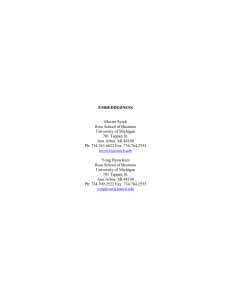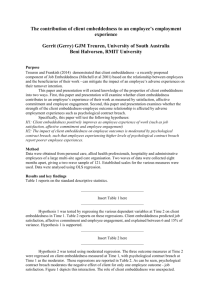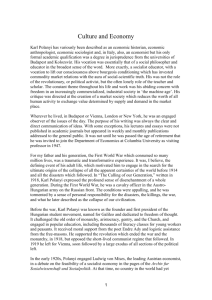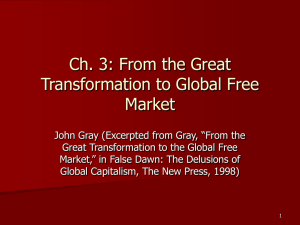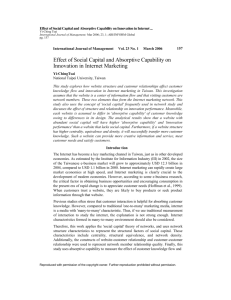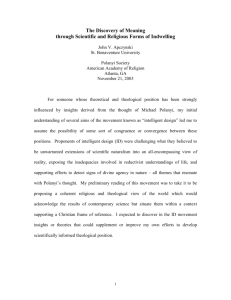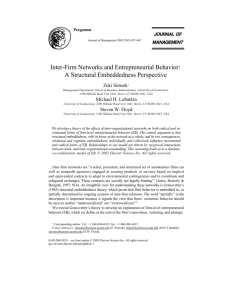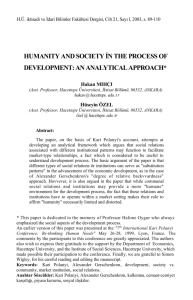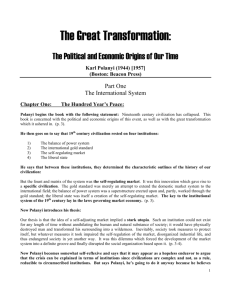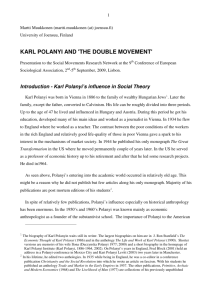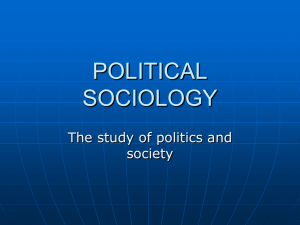Slides part 1 - European University Institute
advertisement
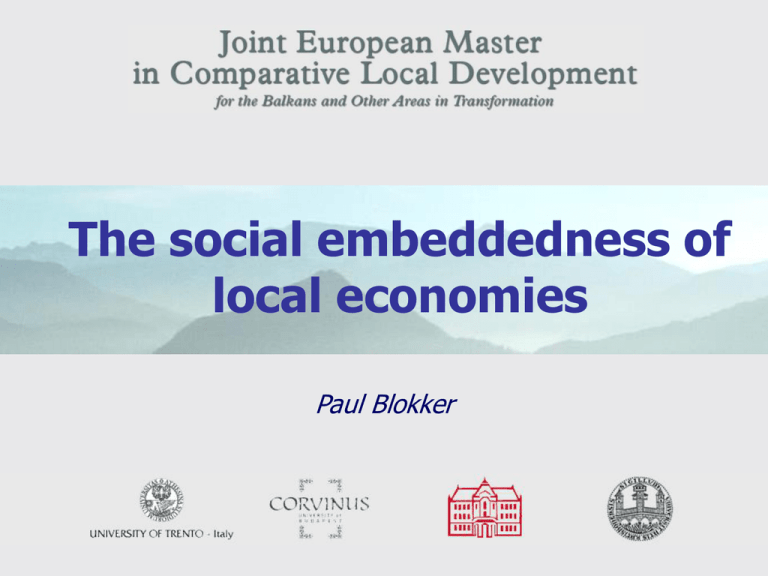
The social embeddedness of local economies Paul Blokker 1 Overview Class Embeddedness 1. Main themes: a. the market economy as independent subsystem b. the social embeddedness of the economy c. different forms of integration: reciprocity, redistribution, market d. the market economy as disembedded e. fictitious commodities: land, labour, and money 2 f. social reactions to disembedment Overview Course Embeddedness 2. Main themes: a. Economic sociology: markets as created, as reliant on external regulation and social norms, as based on forms of trust b Varieties of capitalism: varieties of institutionalizing the market c. liberal market economies and coordinated market economies d. Different modes of governance: state, market, hierarchy, association, community3 Overview Course Embeddedness 3. Relevance: a. An understanding of historical variety of economic activity and its relation to society b. Current economic order designated by convergence towards disembedded markets (globalization), but at the same time by embedded (local) markets (localization) c. Knowledge of the role of institutions and 4 society in reproducing the market Overview Course Embeddedness Relevant literature of the reading list: • • • • • • Beckert, Jens (2007), 'The Great Transformation of Embeddedness: Karl Polanyi and the New Economic Sociology', Block, F. (2000), 'Disorderly coordination: the Limited Capacities of States and Markets’. Crouch, C. et al. (2001), Local production systems in Europe: rise or demise?, Oxford/New York: Oxford University Press, in particular conclusions. Evans, P. (1995), Embedded Autonomy: States & Industrial Transformation, Princeton. Polanyi, Karl (1944), The Great Transformation, in particular chapter 4. Trigilia, C. (2000), Economic Sociology, Blackwell Publishers, 5 in particular chapter 5. 1 Relation between Economy and Society 6 1. Economy - Society Economy as independent system? - neo-classical economics as well as classical sociology presuppose a market economy that is detached from the rest of society, that forms an independent sub-system of its own: the famous ‘invisible hand’ regulates the market, or, the market is ‘selfregulating’ 7 1. Economy - Society Economy as independent system? - A very general definition of the economy is as: ‘a body of activities which are usually carried out by members of a society in order to produce, distribute, and exchange goods and services’ (Trigilia 2002: 2). 8 1. Economy - Society Economy as independent system? - Economists tend to follow a more narrow definition, with an emphasis on ’activities which involve the rational allocation of scarce resources in order to obtain the most from the means available’ (Trigilia 2002: 2). 9 1. Economy - Society Economy as independent system? - Two types of understanding the economy can be identified: 1. Formal: means-ends relationship, actors economizing 2. Substantive: provisioning for the material wants of society 10 1. Economy - Society Economy as independent system? - A standard definition of the market economy would then be something like: An economic system in which entrepreneurs hire workers to produce goods and services to be marketed (sold on the market) with the intention of making a profit. 11 1. Economy - Society Capitalism involves at least 4 principles i. all factors of production (land, labour, means of production such as machinery) are subject to specified property rights; ii. the allocation of scarce resources (primary materials, goods, services) through markets; iii. an economy based on entrepreneurs who take initiatives, make decisions, and calculate risks; iv. ‘civilizational condition’: the primacy of economic values and an inbuilt tendency to subordinate social activities to the goal of unending economic growth. 12 1. Economy - Society Economy as embedded - Increasingly recognized that the market economy is always already embedded in larger society. In other words, a market economy can only function if it relates to, and is sustained by, larger society. 13 1. Economy - Society Economy as embedded - A major thinker who was (one of) the first to elaborate an economic-sociological approach to the embeddedness of markets was Karl Polanyi (anthropologist, sociologist), although he hardly used the notion ‘embeddedness’. 14 1. Economy - Society Karl Paul Polanyi (1886-1964) - Polanyi’s most well-known work is The Great Transformation (1944), which analyses the rise and fall of the self-regulating market society - Polanyi distinguishes in his The Great Transformation between 3 (or actually 4) forms of the ‘integration’ of the economy in society, that is, modes of embeddedness of the economy in wider society. 15 1. Economy - Society Karl Paul Polanyi (1886-1964) 16 1. Economy - Society Economy as embedded - Much of what Polanyi tried to explain in his The Great Transformation was the unicity of the modern market society, and of ‘market fundamentalism’, and the problematic consequences of such a type of ‘market society’. 17 1. Economy - Society Economy as embedded - Polanyi takes a historical approach to the relationship between economy and society, distinguishing three (or four) modes of integration: 1. Reciprocity 2. Redistribution 3. Market (4. Householding) 18 1. Economy - Society Reciprocity - The exchange of goods and services within a (primitive) society is based on traditions related to family and kinship. - Primitive economies functioned on the basis of complex networks of shared obligations that motivated individual behaviour. Polanyi uses the example of Trobriand Islanders in Western Melanesia (cf. Malinowski, 19 Thurnwald) 1. Economy - Society Reciprocity - Reciprocity entails that ‘goods and services are produced and exchanged on the expectation that other goods and services would be received in ways and over periods of time that were fixed by shared social norms’ (Trigilia 2002: 98); NB. not by market supply and demand, or 20 motives of gain or profit. 1. Economy - Society Reciprocity 21 1. Economy - Society Redistribution - Redistribution entails the production and allocation of ‘goods on the basis of norms establishing the modalities of labor services and types of resources that should be transferred to a political chief’ (Trigilia 2002: 98). This type of integration was predominant in larger, imperial types of society (Egypt, 22 Mesopotamia). 1. Economy - Society Redistribution 23 1. Economy - Society Market - The market society is based exchange of goods through regulated trade, in which prices from the unrestrained interaction of and supply. on the marketemerge demand 24 1. Economy - Society Market NB. But the Market Society also demands different from markets - that the production of goods and services, as well as the distribution of income, depend on a priceregulated market (Trigilia 2002: 98). 25 1. Economy - Society Market 26 1. Economy - Society (Householding) - Householding (what the Greeks called ‘oeconomia’/’oikon’) consists in the production for one’s own use, thus providing for one’s self-subsistence (normally for the family). 27 1. Economy - Society Embeddedness of economy - Polanyi thus theorizes various forms of embeddedness of the economy. - The notion of embeddedness has become a key notion in economic sociology. - Often, however, the interpretation is very different from Polanyi’s. 28 1. Economy - Society Embeddedness of economy - For Polanyi, embeddedness is: 1. Markets as necessarily limited by institutional regulations which connect them to the moral fabric of society. Unregulated markets will lead to social anomie. 2. In a normative sense, embeddedness refers to a social reformist view of society, in which the state needs to ‘tame’ 29 the market (Beckert 2007: 8). 1. Economy - Society Embeddedness of economy - One of the first to pick embeddedness up was Mark Granovetter. His interpretation is embeddedness as social networks: Economic action is ‘embedded in concrete, ongoing systems of social relations’ (Granovetter 1985). E.g. immigrant networks, information networks, organization of financial markets. 30 1. Economy - Society Embeddedness of economy - A more complex definition – closer to Polanyi – is provided by Zukin and Dimaggio (1990): 1. 2. 3. 4. Cultural embeddedness Cognitive embeddedness Political embeddedness Structural embeddedness 31 1. Social Question Double movement - Polanyi argues that the commodification of fictitious commodities, i.e., those factors that are not produced for the market, leads to social resistance 32 1. Social Question Double movement - Double movement: too much commodification and disembedment leads to attempts to re-embed the economy. - At the end of the 19th century, the social reaction consisted of labour unions, socialist parties. 33 1. Social Question More on Karl Polanyi - http://polanyi.concordia.ca/ - http://homepage.newschool.e du/het//profiles/polanyi.htm 34 1. Social Question More on Karl Polanyi - … 35
